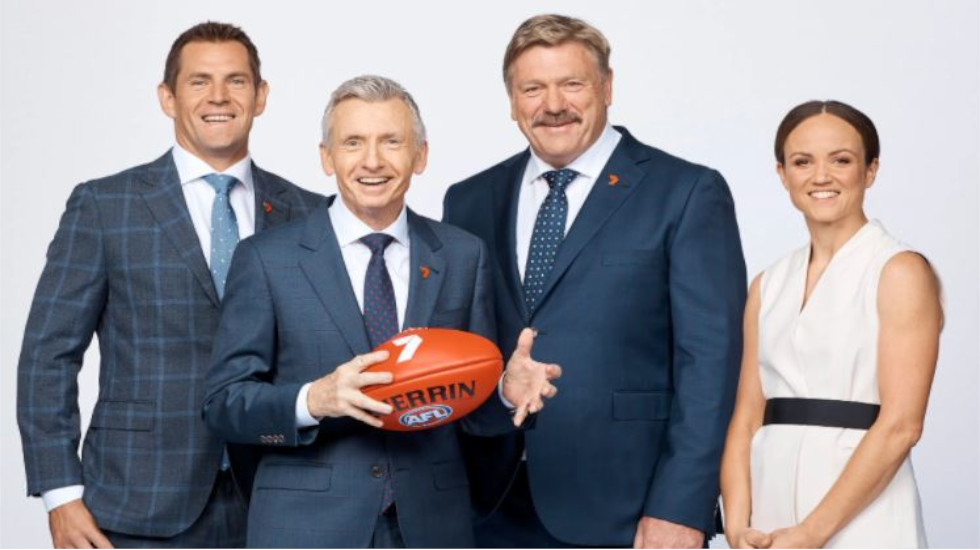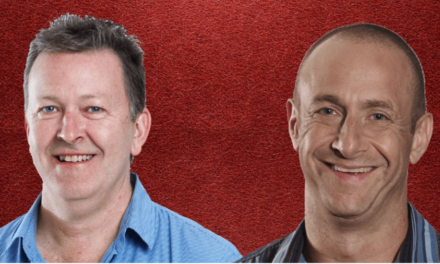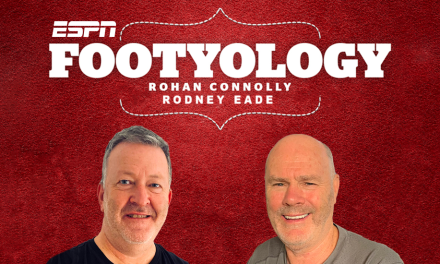From left: Luke Hodge, Bruce McAvaney, Brian Taylor, Daisy Pearce, part of the 2020 Channel 7 commentary team.
At the height of his playing fame with Richmond and Collingwood – including a Coleman Medal with Collingwood – Brian Taylor was running a plumbing business. He’d do house calls during the day and train afterwards.
He was 16 years old when he flew over from Western Australia to join the Tigers. Mum and dad stayed behind. He’s still here, decades later, calling the game.
Luke Darcy, like his old man, went into pubs. Indeed, a clan of Darcy’s siblings went into the family business, too. He was recruited by the Doggies from South Adelaide at the age of 18. He remains on our screens today after transitioning seamlessly to TV and radio post-retirement.
Wayne Carey’s history is more troubled than most. A disturbing backdrop of family violence afflicted his childhood, while affairs, drugs and violence plagued the aftermath of his halcyon days. Yet he has righted the ship, seizing a second chance to write and commentate on the game.
Is this a tick of approval for the way this particular trio calls or opines? Absolutely not. Is it grudging respect for making their mark and flourishing in the media after hanging up the boots? For sure, especially in light of their respective backgrounds.
Perhaps we all suffer from short-term memory loss, but the criticism of the game’s coverage, notably Channel 7’s presentation, seems especially ferocious in this compromised season. Social media is boiling over with countless keyboard warriors lambasting those whose crime it is to attempt to bring joie de vivre into lounge rooms of a weekend.
How else would you expect to pass the time during a pandemic than crack open a bevvy, scroll down on Twitter and dribble the term “flog” on every post to do with someone in footy?
The problem for them all, these lauded players of our game, is exacerbated because the broadcasting package is now the dominant feature of the AFL landscape.
Across wall-to-wall national coverage, they and their electronic media peers are required to be “personalities” and light entertainers, faces of the networks which underwrite the financial viability of the competition.
Such exposure means every slip up, every misspoken name and attempts at humour which fall flat, are magnified and amplified. Even during these times, when the likes of Taylor and veteran network man Bruce McAvaney are calling remotely.
For our expectation remains, in light of grinding, characterless and frequently scoreless play, to be entertained. The broadcast is the hero, whereas once upon a time the game itself was the main event; those accompanying the televised production had little need to add spice or pad out moments of monotony.
Indeed, back in the VFL days when the Seven Network shared television rights with the ABC, there was a distinct and deliberate contrast in commentary style. The ABC’s approach was superior, according to its then head of sport in Victoria, Dick Mason, because “…we shut up.”
“He [Mason] had opted for an English soccer style of calling,” recalled Tim Lane. “He felt that the commercial coverage was very similar to radio commentary, so I tried to take on that style, which was something of a purist’s approach and attitude. I’m not sure if it was right – it would seem consumers of Aussie rules want a wall of words.”
Fast forward to commentary as a circus act – with Rex Hunt as ringmaster – and cloth-eared past and present players cajoled into performing skits on “The Footy Show”, the game itself gradually lost centre stage.
Now, swamped by lifestyle segments, the ubiquitous sell of punting options, trivialities sensationalised as news and a raft of non-playing events – Brownlow, draft, trade week – the on-field stuff is further marginalised.
Let me say it again: this is not a defence of the above players-turned-commentators. Far from it. In fact, if this columnist never heard a word uttered by any of them again in the context of a sporting broadcast, special thanks would be owed to Jehovah, Buddha or any other imaginary deity.
“BT” is no Tim Lane or Dennis Cometti. Matthew Richardson will never be Lou Richards. The “Duck” – and he has gone to lengths to improve his diction – cannot possibly replicate the passion, colour and verve of Ted Whitten.
But let’s get a grip. When teams are laying more tackles than scoring points, as the old colloquialism reminds us, they can but try to turn manure into strawberry jam.











I think the broadcasters have put too many eggs in the ex-AFL player bucket. I say that because they don’t make the best callers. The best commentators that come to my mind are not ex-AFL players: Jason Bennett, Nigel Carmody from the Ch7 VFL (both who don’t seem to get much of a crack at AFL coverage – which I find baffling) and Anthony Hudson are the first three that come to mind. Beyond that, Bruce McAvaney (used to be a decent caller, but is unbearable now) Tim Lane, Peter Landy, Drew Morphett and Denis Commetti also spring to mind. Hell, even Mark Howard is pretty good.
None of them (at least as far as I’m aware) are ex-players. Not saying no ex-players are good commentators (Nick Riewoldt is pretty good for example) but most of them are *terrible*. Any time someone talks about AFL commentators you have to make excuses and defend them – as you did.
I’m not saying *I* could do a better job than the ex-players who are employed to do this job – but there are people out there who clearly can. If the broadcasters were serious about improving their coverage and the quality of their commentary they would have ditched a bunch of the ones currently employed (Richardson, Ling, *ugh* Lynch, Carey, Darcy etc), stop trying to shoe-horn them into the coverage (making us sit through their training days) and employ people who are actually good at the job.
The fact that they haven’t gone down that path says that they’re happy with mediocre callers, that nepotism and connections are more important than talent.